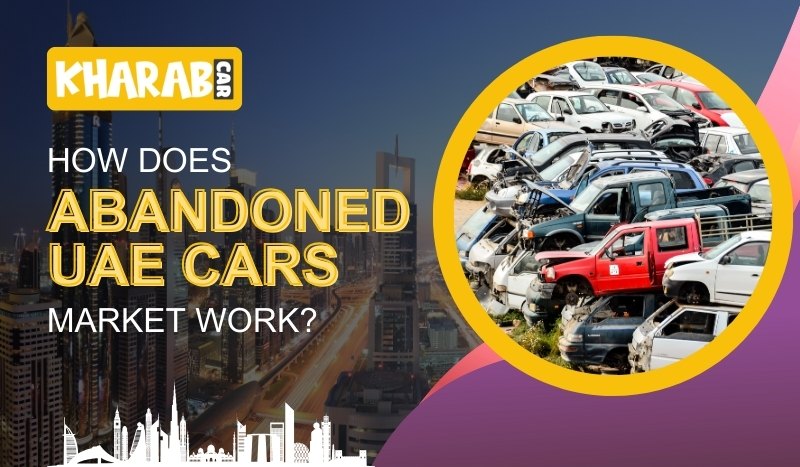- Barsha Heights - Dubai
- info@kharabcar.com
- +971 55 722 7700
How Does Abandoned UAE Cars’ Market Work?

How Does Abandoned UAE Cars’ Market Work?
In addition to the lively car culture, the United Arab Emirates is known for this strange phenomenon: hundreds of thousands of abandoned cars that stay in the parking lots, airports, and streets of cities like Dubai and Abu Dhabi. Since this unused potential attracts attention to itself, a whole market hinges on the purchase, selling, and recycling of such abandoned vehicles.
Here is an up-close look at the abandoned car market in the UAE and the considerable work being done by companies such as KharabCar toward the same end.
Why Are So Many Abandoned Vehicles in the UAE?
There are many abandoned cars in the United Arab Emirates, and it can be attributed to several reasons. Many expatriates live in the country, and when they move out, they leave the cars behind without selling abandoned cars or making adequate arrangements for exporting them.
In case of a financial crunch, the car owners surrender their vehicles. This is because of the strict rules of the UAE regarding debt regulations. In this way, they ensure that they face no monetary or legal liability because of defaulted auto loans.
In a country that is known for luxury automobiles, some of the abandoned automobiles are high-end models abandoned by owners who could not or could not afford upkeep or repairs. Businesses in the United Arab Emirates, such as salvage companies, auction houses, and parts resellers, have the opportunity to recycle or repurpose abandoned automobiles.
The Auction Process for Abandoned Automobiles
An abandoned vehicle has to go through a certain legal procedure once the police identify and take away the vehicle prior to selling it. The general process in dealing with abandoned cars is as follows:
Identification and Notification: Once an abandoned vehicle is identified, law enforcement or local authorities try to reach out to the registered owners. The vehicle is confiscated if the owner does not respond.
Auctioning: The car is auctioned after a period of impoundment and thorough inspection. Buyers may range from individual citizens to companies, which bid for the cars through the prescribed auction houses in the UAE.
Vehicle History and Condition Reports: The history and condition of every car are checked, and this is documented before sale. The buyer is well-equipped with such knowledge to enable the making of an informed decision regarding the probable scrap or resale value.
Who Collects Abandoned Cars in the UAE?
Huge variations of customers are attracted to the market of used cars. Most auto dealers buy junk cars, refurbish them, and then sell them either in the local market or export to other markets.
Some crashed vehicles are valuable only to the parts, as they have been absolutely wrecked beyond repair or can't be repaid through the costs of revival. Such cars are sold to scrap yards and recycling houses that sell used parts, for example, KharabCar.com.
Some collectors seek the costliest or odd-looking vehicles at a reduced price for subsequent reconditioning.
The advantages of the UAE's abandoned automobile market include the following:
There are numerous benefits that come to consumers, companies, and even the neighborhood through sales from used car markets, in the sense that they sell at relatively very reasonable prices of vehicles, both complete cars and the required spare parts for customers at both auction and salvage selling points. Thus, reducing prices of the spare part supply for car repair firms.
Car recycling reduces the quantity of junk. By disassembling the cars to their reused parts and directing all garbage, KharabCar promotes the minimum environmental impact. Auctioning, taxation, and sales revenues to companies: It gives the government and local firms of the United Arab Emirates the majority revenue in the deserted car industry.
Abandoned Cars Purchase and Sales UAE Laws
To ensure that all business transactions are valid and not transparent, businesses in the abandoned automobile market require conformity with the laws of the UAE. Some of the legal factors are as follows:
Transfer of Ownership: To lawfully transfer ownership, the buyer needs to get registered.
History of the Vehicle: The history of a vehicle must be clear of any pending penalties or obligations before its sale. In the UAE, there are strict restrictions in this regard to secure consumers.
Taxes and Fees: Charges that are mostly associated with the registration and transfer of ownership of abandoned vehicles are to be considered by the buyers.
Challenges in the UAE's Abandoned Automobile Industry
Due to long-time exposure to the harsh desert climate, abandoned automobiles frequently experience wear and tear. The vehicle may be left in a condition that may require extra inspections and repairs.
Some cars left abandoned bear unpaid loans or unserved fines. In such cases, as ownership cannot be transferred until these debts are cleared, it complicates the purchase procedure.
Conclusion
With new possibilities for recycling and reselling constantly surfacing, the UAE market for abandoned cars is certainly not slowing down. KharabCar and others like it are important as they give value to abandoned cars by giving components and recycling options. This can help the environment and community. The industry of abandoned cars in the UAE is predicted to grow gradually with additional regulatory changes and increasing buyer demand, thereby offering unique opportunities for businesses, buyers, and sellers.
